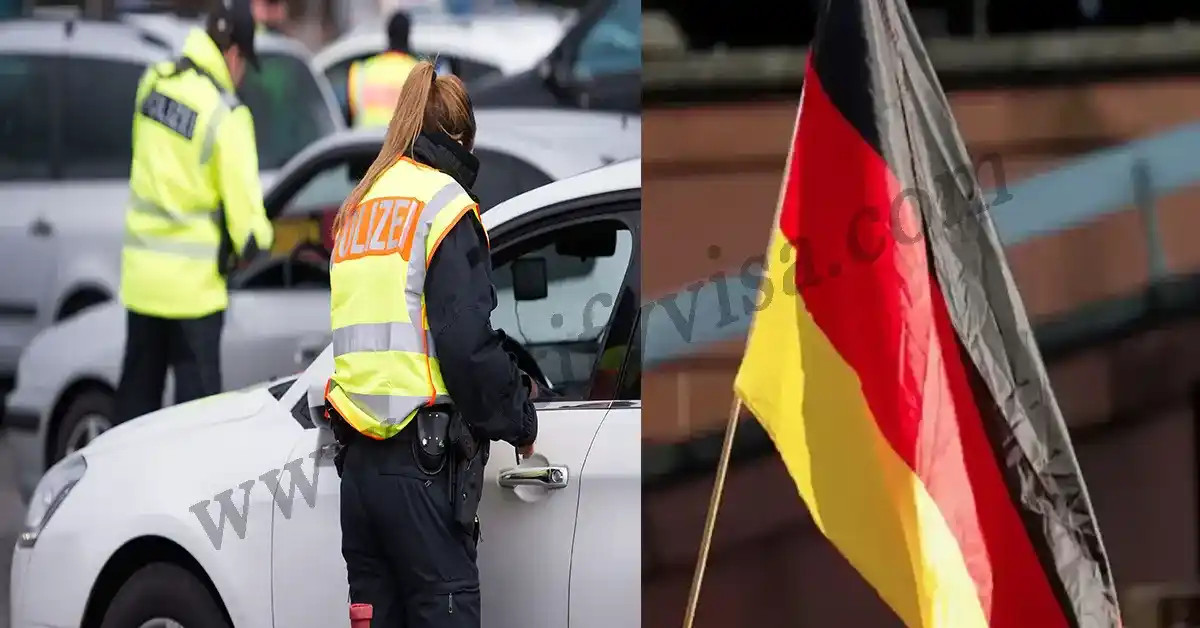Germany’s decision to tighten controls at all of its land borders appears to be motivated primarily by politics, is difficult to justify in legal terms, strikes a major blow to Europe’s valued free movement, and may put EU unity to the test.
Berlin declared on Monday that as of next week, controls that have been in place at its borders with Poland, the Czech Republic, and Switzerland since 2015 will also extend to France, Luxembourg, Belgium, the Netherlands, and Denmark.
The action will reduce migration and “protect against the acute dangers posed by Islamist terrorism and serious crime,” said Interior Minister Nancy Faeser.
Just a few days before significant regional elections in eastern Germany, where the far-right, anti-immigrant Alternative for Germany (AfD) party achieved historic gains in two states, a deadly knife assault took place in Solingen last month. The suspects in the crime were asylum seekers.
According to polls, migration is also the top concern of voters in Brandenburg, which holds its elections in a fortnight – with Olaf Scholz’s center-left Social Democratic party expected to finish second to the far-right party – and the chancellor’s ailing coalition appears to be on track for a crushing defeat in federal elections next year.
Check Also: Greece Boosts Startup Sector with New Tax Incentives and Golden Visa Expansion
Marcus Engler of the German Centre for Integration and Migration Research stated, “The government’s goal seems to be to show Germans and prospective migrants that they are no longer wanted here, symbolically.”
Faeser said the new regulations will include a plan that would allow more people to be turned back at the border, but he did not elaborate. Amid their disbelief, diplomats and officials in Brussels have described the proposal as “transparent” and “obviously aimed at a domestic audience”.
Germany’s important position in the EU, as well as its reputation as the bloc’s largest economy, suggest that the controls, which will go into effect on September 16 for six months, could have far-reaching consequences beyond the country’s voters.
The Schengen region, which was created in 1985 and currently includes four additional countries, including Switzerland and Norway, along with 25 of the 27 EU members, allows for free travel between all of them without the need for border controls.
Temporary checks are permitted in emergencies and unusual circumstances to prevent specific dangers to internal security or public policy, and have often been enforced following terrorist attacks, large sporting events, and the pandemic.
However, European governments, frequently under pressure from far-right rhetoric on immigration, have increasingly reimposed checks without providing a rationale for apparent and specific concerns, or convincing justifications for how controls may assist in alleviating them.
Many analysts contend that regardless of national decisions about immigration laws and asylum processes, for example, European free movement provides for an easy target and that “taking back control of borders” makes for compelling headlines.
In addition to Germany, other Schengen countries that presently enforce border controls include Austria, which checks asylum requests from Slovakia, the Czech Republic, Slovenia, and Hungary citing security dangers relating to Ukraine.
Denmark is inspecting German land and sea transportation, citing terror dangers associated with the Gaza War and Russian espionage risks; France, on the other hand, is checking entries into the Schengen zone due to heightened terror threats.
Border checks are also being conducted by Italy, Norway, Sweden, Slovenia, and Finland. The reasons given for these operations vary and include terrorist activities, conflicts in the Middle East and Ukraine, Russian intelligence operations, an increase in migrant flows, and organized crime in the Balkans.
The European Commission, which is the guardian of the Schengen Treaty and was informed of Germany’s intentions on Monday, has unquestioningly accepted the arguments put forth by member states to reinstate temporary controls.
Even if there doesn’t seem to be much of a practical need for checks on all nine of the nation’s borders other than the anti-immigration extreme right’s electoral threat, observers anticipate that Berlin’s demand will receive the same treatment.
Member states may take such action to counter “a serious threat,” according to a Tuesday statement from the commission. However, the actions must be “necessary and proportionate” and “remain strictly exceptional.”
Alberto Alemanno, a HEC Paris professor of European law, argued that the German limits, which are only temporary, “represent a manifestly disproportionate breach of the principle of free movement within the Schengen area.”
He stated, “It won’t work under EU law, but will this stop Scholz from moving forward?” Even harsher criticism came from University of Vienna professor Christopher Wratil, who charged that Berlin was “governing as if the AfD were already in power.”
German lawmakers “should no longer tell me that somebody else is failing to comply with EU law after today,” Wratil declared. wanting to completely remove Schengen with a single penstroke and without giving it any thought.
Others emphasized the Schengen zone’s economic significance. In 2016, the Bertelsmann Foundation calculated that the return of internal border controls would cost Europe approximately €470 billion (£397 billion) in lost growth over ten years.
The European Stability Initiative think tank chair, Gerald Knaus, also questioned the effectiveness of the measure. Knaus stated on X that “internal border controls that are intended to have any effect mean the end of Schengen.”
They “will fail if neighbors are not interested in participating,” he added, and they would also need “federal border protection and fences around Germany.”
European unity may be put to the test if Germany requests that a substantial number of its neighbors return their citizens, given that the EU only just this year finally chose to rewrite its laws regarding immigration and asylum. The regulations are not expected to take effect until 2026.
The Polish prime minister, Donald Tusk, referred to Berlin’s decision as “unacceptable” on Tuesday and asked for immediate discussions. Meanwhile, Austria has already stated that it will not accept back any migrants who are turned away at the German border.




zlq4dy
Explora los momentos mas importantes de Ramos en Espana y PSG | Descubre la vida fuera de las canchas de Sergio Ramos | Conoce los logros de Ramos tanto en club como en seleccion | Explora los titulos ganados por Ramos en el Real Madrid | Explora los detalles de los contratos y fichajes de Ramos | Descubre el legado que Ramos deja en el futbol internacional | Descubre el compromiso de Ramos con sus clubes y la seleccion | Explora la historia de Ramos en el futbol y sus logros | Descubre los aspectos personales y profesionales de Ramos, Ramos en la seleccion de Espana Seleccion Espana Ramos.
Погрузитесь в мир ставок и азартных игр с Мостбет | Скачайте приложение Мостбет для удобного доступа к ставкам | Мостбет – это качество и надёжность для всех игроков | Все ставки и азартные игры в одном приложении – Мостбет | Легкий доступ к ставкам на сайте и приложении Мостбет | Играйте в любые азартные игры на Мостбет с бонусами | Качественные слоты и быстрые выплаты на Мостбет | Надёжный доступ к играм через приложение Мостбет | Азартные игры с удобной навигацией – Мостбет, Mostbet официальный сайт Mostbet зеркало.
mvnjpm
Explora la trayectoria futbolistica de Paul Pogba | Explora la carrera de Paul Pogba y sus equipos actuales | Informate sobre la vida familiar de Pogba | Descubre la influencia de Pogba en sus equipos | Descubre como Pogba ha influenciado a jovenes futbolistas | Conoce el papel de Pogba en Juventus y PSG | Conoce los logros de Pogba en clubes como Juventus | Descubre el impacto de Pogba en la liga de Italia | Explora los momentos clave en la vida de Pogba, Pogba Juventus PSG Pogba Juventus.
Conoce mas sobre la vida y familia de Ronaldinho | Descubre los momentos iconicos de Ronaldinho en su carrera | Explora los exitos de Ronaldinho en Europa | Informate sobre la vida de Ronaldinho mas alla del futbol | Conoce los exitos y premios de Ronaldinho en su carrera | Conoce el estilo de juego que hizo famoso a Ronaldinho | Conoce el perfil de Ronaldinho en sus ultimos anos | Descubre la habilidad y destreza de Ronaldinho en el futbol | Informate sobre las estadisticas y logros de Ronaldinho, Ronaldinho en el Milan https://ronaldinho-es.org.
Мостбет – это ваши любимые игры и ставки в одном месте | Здесь можно найти самые популярные слоты и игры – на Мостбет | Мостбет – это ваш идеальный выбор для азартных игр | Получите шанс на выигрыш с бонусами от Мостбет | Пользуйтесь рабочими зеркалами для доступа к Мостбет | Найдите выгодные ставки на спорт в Казахстане с Мостбет | Всё для ставок и азартных игр – это Мостбет | Играйте в слоты и выигрывайте реальные деньги на Мостбет | Лучшие бонусы и акции на официальном сайте Мостбет, Мостбет слоты слоты Мостбет.
Informate sobre el valor de mercado de Vinicius en Transfermarkt | Conoce como Vinicius inspira a los jovenes futbolistas | Descubre los premios y reconocimientos de Vinicius | Conoce los datos sobre la posicion y equipo de Vinicius | Conoce los datos mas curiosos de Vinicius Jr. en el futbol | Conoce la vida familiar y personal de Vinicius Junior | Conoce el impacto de Vinicius en sus equipos | Descubre los entrenadores que han apoyado a Vinicius | Explora la historia y legado de Vinicius en el Real Madrid, Vinicius en el Real Madrid Real Madrid Vinicius Junior.
Informate sobre el viaje de Marcelo desde Brasil hasta ser estrella mundial | Descubre los secretos de la longevidad de Marcelo en el futbol | Informate sobre la pasion de Marcelo por el deporte y la competencia | Descubre los logros de Marcelo a lo largo de su carrera profesional | Explora como Marcelo ha inspirado a las nuevas generaciones | Informate sobre los datos mas recientes de Marcelo en el futbol | Explora los mejores goles y asistencias de Marcelo | Explora como Marcelo ha sido un modelo a seguir en el deporte | Conoce la carrera de Marcelo desde sus inicios hasta la actualidad, Marcelo Transfermarkt Transfermarkt Marcelo Vieira</url].
Оцените преимущества и бонусы от Mostbet | Получите рекомендации по ставкам от экспертов Mostbet | В Mostbet вас ждут уникальные условия и бонусы | Узнайте, как начать выигрывать с Mostbet прямо сейчас | Станьте частью сообщества Mostbet и начните выигрывать | Онлайн-казино Mostbet предлагает только честные игры | Погрузитесь в мир онлайн-казино с Mostbet | Выигрыши и бонусы доступны в Mostbet круглосуточно | Консультации и поддержка доступны 24/7 в Мостбет мост бет.
Decouvrez les meilleures options pour les paris en ligne sur Mostbet Maroc | Les meilleurs gains avec Mostbet Maroc | Accedez aux options de casino et paris sportifs avec Mostbet mostbet maroc http://telecharger-mostbet-apk-maroc.com.
La qualite des jeux est assuree avec Mostbet | Beneficiez d’un jeu responsable et securise avec Mostbet | Mostbet Maroc garantit des cotes attractives pour chaque match | Jouez en ligne en toute confiance avec Mostbet | Mostbet propose des promotions exclusives pour les utilisateurs marocains | Mostbet est reconnu pour ses cotes competitives au Maroc | Mostbet est concu pour une experience de paris fluide et securisee | Mostbet Maroc, une plateforme de confiance pour parier | Essayez Mostbet pour une experience de jeu inoubliable most bet most bet.
Recevez des conseils d’experts sur Mostbet Maroc | Obtenez des promotions speciales en telechargeant Mostbet | Mostbet Maroc, votre destination pour les jeux en ligne | Decouvrez les avantages de Mostbet pour les joueurs marocains | Des bonus de bienvenue sont disponibles sur Mostbet | La plateforme Mostbet Maroc est a la pointe de la technologie | Mostbet est concu pour une experience de paris fluide et securisee | Mostbet vous propose des options de paiement securisees | Mostbet est votre solution pour les paris en ligne au Maroc mostbet telecharger telecharger-mostbet-maroc.com.
Registre-se no Mostbet e ganhe bonus para comecar | Descubra as melhores odds no site de apostas Mostbet | Participe do cassino online Mostbet e ganhe premios em dinheiro | Descubra as vantagens de apostar no Mostbet | Participe das apostas ao vivo do Mostbet para emocao em tempo real | Participe dos eventos de cassino ao vivo no Mostbet Brasil | Baixe o Mostbet apk e esteja sempre pronto para apostar | Baixe o Mostbet app e tenha acesso rapido as apostas | Explore uma variedade de jogos de qualidade no Mostbet site mostbet site mostbet.
Скачайте приложение Mostbet и делайте ставки с удобством | Mostbet — платформа для всех, кто любит азартные игры | Используйте рабочее зеркало для беспрепятственного входа в Мостбет | Откройте мир азартных игр с Mostbet Casino | Легкая регистрация и доступные бонусы на Mostbet | Скачайте приложение Мостбет и наслаждайтесь игрой | Скачайте Мостбет и делайте ставки без ограничений | Испытайте азарт с казино Mostbet UA | Выбирайте лучшие слоты и игры на сайте Мостбет https://mostbet-ua-casino.kiev.ua
Jogue em cassinos e faca apostas esportivas com Mostbet | Aposte no Mostbet e descubra o melhor em cassinos online | Experimente o emocionante jogo Aviator no Mostbet | Descubra jogos e probabilidades incriveis no Mostbet | Mostbet – seu parceiro ideal para apostas online cassino mostbet
Насолоджуйтеся зручним інтерфейсом та великим вибором ігор в Mostbet | Ваш шанс виграти на Mostbet прямо зараз | Починайте грати на Mostbet та відчуйте азарт перемог | Випробуйте свою удачу на офіційному сайті Mostbet | Грайте в Mostbet та отримуйте щедрі бонуси грати на мостбет
Aviator o‘yinini Mostbet-da o‘ynab yutish imkoniyatiga ega bo‘ling | Mostbet sayti orqali yangi yutuqlar uchun imkoniyat yarating | Mostbet bilan o‘yinlar va pul tikish uchun qulaylik va tezkor to‘lovlar | Mostbet bilan yuqori koeffitsiyentlar va katta yutuqlar oling | Mostbet O‘zbekiston bozorida yetakchi o‘yin platformasi mostbet официальный сайт
Почніть грати з мостбет і отримайте бездепозитний бонус | Легке завантаження мостбет на мобільний телефон | Mostbet – ваш надійний партнер для ставок в Україні | Отримуйте задоволення від ставок на mostbet онлайн | Легко реєструйтеся та грайте на mostbet без зусиль офіційний сайт мостбет
Скачайте додаток мостбет для зручності | Офіційний сайт mostbet чекає на вас | Легке поповнення і швидкий виграш на мостбет | Доступ до ставок і казино на mostbet завжди | Завантажте mostbet для гри у будь-який час казино mostbet
Mostbet-ning rasmiy saytida doimiy aksiyalar va bonuslar | Mostbet sayti orqali yangi yutuqlar uchun imkoniyat yarating | Mostbet-da Aviator kabi qiziqarli o‘yinlar mavjud | Mostbet-ning rasmiy saytiga har doim kirish imkoniyati mavjud | Mostbet-da yuqori darajadagi o‘yinlar va yutuqlarni sinab ko‘ring mostbet bonus
Sign up for Mostbet and start winning | Join Mostbet for exclusive promotions and rewards | Play your favorite games on Mostbet Bangladesh | Mostbet login gives you access to endless gaming options | Download Mostbet for the best online betting experience | Mostbet app provides everything you need for online gaming Mostbet registration.
Mostbet provides fast registration and instant rewards | Discover the Aviator game on Mostbet and boost your chances | Enjoy live sports betting with Mostbet in Bangladesh | Mostbet app offers seamless navigation and features | Enjoy 24/7 customer support on Mostbet Bangladesh | Mostbet is the best platform for online betting | Access live scores and updates on Mostbet online Mostbet bonuses.
Sign up for Mostbet and start winning | Join Mostbet for exclusive promotions and rewards | Bet anytime, anywhere with the Mostbet app | Win real money with Mostbet casino games | Mostbet promo codes unlock extra bonuses for players | Mostbet registration takes less than a minute Play Aviator on Mostbet.
Explore Mostbet Bangladesh for great gaming experiences | Win exciting rewards with Mostbet casino bonuses | Mostbet casino provides endless entertainment options | Experience the thrill of live betting with Mostbet | Get started with Mostbet for exciting betting options | Mostbet is the best platform for online betting | Access live scores and updates on Mostbet online Mostbet online gaming.